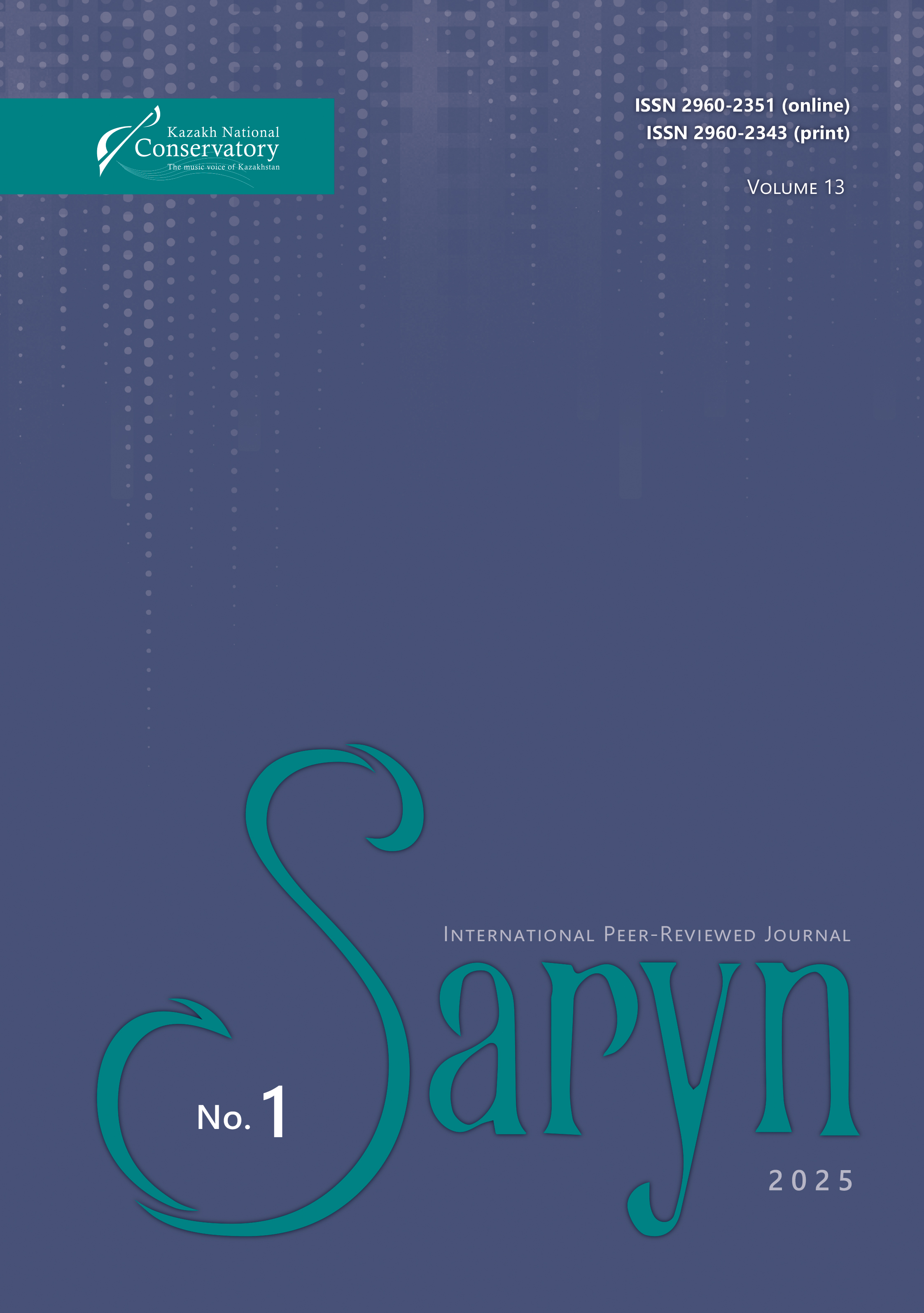Article information
Article publication date
2025-03-22
Article Page
37–50
Chapter
Arts & Humanities
License
Abstract
Two generative models of Uzbek musical culture emerged in the context of the coexistence of a traditional system, professional oral tradition music (a term by Faizulla Karomatov), and European-style compositional thinking. Based on this fact, the object of study is the work of contemporary Uzbek composers, focusing on their working methods centered on the interaction between Eastern and Western musical traditions. The relevance of the article stems from the need to understand the integration of traditional sound structures into compositional practices, as well as the mechanisms of their transformation. A balance between historical heritage and innovative techniques is an important prerequisite for modern national schools of composition.
The methodology of the study is supported by the concepts of musical invariants and generative systems. Based on this, the structural and compositional principles of maqom[1] and katta ashula[2] are analyzed, as well as their adaptations by composers in the symphonic genre. Historical, stylistic and comparative methods are used.
The basic questions addressed in the work concern the evolution of the national Uzbek compositional school. The first experiments, started in the second half of the 20th century, are characterized by the citation of maqom material, as well as the emergence of more complex forms of its synthesis with Western musical schools. Examples of the works of composers Rustam Abdullayev, Mirsadyk Tadjiyev, and Jahongir Shukur are demonstrated as various strategies for integrating traditional musical elements into original compositions.
As a result of the conducted study, it can be argued that contemporary Uzbek musical culture represents a rather dynamic creative system, where the principles of professional music of the oral tradition form new polyphonic structures, notational expansions, and timbral solutions. Thus, the practical significance of this work will make it possible to apply the principles described in the study in composing education and technique, including the performing practice. In addition, further study of the mechanisms of interaction between Uzbek musical traditions in a global context will be productive.
Keywords
Uzbekistan’s musical culture
generative models
professional oral tradition music
innovative techniques
maqom
musical invariants
Uzbek compositional school
References
Aranovsky, Mark. Muzyka. Myshlenie. Zhizn': stat'i, interv'yu, vospominaniya [Music. Mind. Life: Articles, Interviews, Memoirs]. Moscow, Gosudarstvennyi institut iskusstvoznaniya, 2012. (In Russian)
Aranovsky, Mark, editor and compiler. “Myshlenie, yazyk, semantika.” [“Thinking, Language, Semantics.”]. Problemy muzykal'nogo myshleniya. Sbornik statei. [Problems of musical thinking. Collection of articles]. Moscow, Muzyka, 1974, pp. 90–128. (In Russian)
Asafyev, Boris. Pisma k Zataevichu A. V. [Letters to A. V. Zatayevich]. Archive of the Russian National Museum of Music, Moscow. Fund 6, Inventory 214–224, Storage unit 1498. (In Russian)
Boot, Peter, et al. “Evaluating the Role of Repeated Patterns in Folk Song Classification and Compression.” Journal of New Music Research, vol. 45, no. 3, 2016, pp. 223–238. DOI: 10.1080/09298215.2016.1208666.
Drozhzhina, Marina. Molodye natsional'nye kompozitorskie shkoly Vostoka kak yavlenie muzykal'nogo iskusstva XX veka. [Young National Composition Schools of the East as a Phenomenon of Musical Art of the 20th Century]. 2005, Glinka Novosibirsk National Conservatory, Doctor of Art History thesis’s abstract. (In Russian)
Ganikhanova, Shoyista. “Muzyka v kino Uzbekistana v kontekste problemy sinteza iskusstv.” [“Cinema Music in Uzbekistan in the Context of the Issue of Synthesis of the Arts.”] Problemy muzykal'noi nauki, no. 4, 2021, pp. 189–196. DOI: 10.33779/2782-3598.2021.4.189-196. (In Russian)
Khaknazarov, Zakid. “Uzbekskaya muzyka 70-kh. Razmyshleniya dirizhera.” [“Uzbek Music of the 70s. Reflections of the Conductor.”] Sovetskaya muzika, no. 5, 1981, pp. 11–14. (In Russian)
Kokisheva, Marlena. Simfonicheskii kyui v tvorchestve sovremennykh kompozitorov Kazakhstana: genezis zhanra, tipologiya i razvitie [Symphonic Kui in the Works of Contemporary Composers of Kazakhstan: The Genesis of the Genre, Typology and Development]. 2016, Kurmangazy National Consevatory, Almaty, PhD thesis. (In Russian)
Kutluchurina, Alina. “Zvukovoi mir Dzhakhongira Shukurova (na primere sochineniya “Aks Sado” dlya violoncheli solo.” [“Sound World of Jahongir Shukurov (on the Example of the Composion “Ax Sado” for Solo Cello).”] Problemi sovremennoy nauki i obrazovaniya, vol. 147, no. 2, 2020, pp. 92–95. (In Russian)
Raimkulova, Aktoty, and Raushan Jumaniyazova. “Dialektika arkhaiki v sovremennom muzykal'nom iskusstve Kazakhstana v zerkale idei evraziistva (na primere violonchel'nykh sochinenii sovremennykh kompozitorov).” [Dialectics of Archaic in the Contemporary Musical Art of Kazakhstan in the Mirror of the Ideas of Eurasianism (on the Example of Cello Compositions of Contemporary Composers).”] Muzykovedenie, no. 8, 2018, pp. 11–20. DOI: 10.25791/musicology.08.2018.111. (In Russian)
Shukur, Jahongir. Speech at a master class within the Omnibus Laboratorium project. The State Сonservatory of Uzbekistan, June 2021, Tashkent.
Ulmasov, Firuz. “Ob invariante kak printsipe modelirovaniya muzykal'nogo protsessa.” [“On the Invariant as a Principle of Modeling the Musical Process.”] Muzykal'noe iskusstvo Evrazii. Traditsii i sovremennost', no. 3, 2024, pp. 30–45. DOI: 10.26176/MAETAM.2024.16.3.002. (In Russian)
Yanov-Yanovskaya, Natalia. “Bogatstvo mnogoobraziya.” [“The Wealth of Diversity.”] Uzbekskaya muzika i XX vek [Uzbek Music and the 20th Century]. Tashkent, 2007, p. 7. (In Russian)
Yanov-Yanovskaya, Natalia. “Makomnye traditsii v uzbekskoi simfonicheskoi muzyke.” [“Maqom Traditions in Uzbek Symphonic Music.”] Maqoms, Mughams, and Modern Compositional Art, proceedings of the Inter-republican Scientific and Theoretical conference. Edited by D. Rashidova, Tashkent, Publishing House of Literature and Art, 1978, pp. 172–189. (In Russian)
Yanov-Yanovskaya, Natalia. “Odna kul'tura – dve traditsii.” [“One Culture – Two Traditions.”] Uzbekskaya muzika i XX vek [Uzbek Music and the 20th Century]. Tashkent, 2007, pp. 213–230. (In Russian)
Yunussova, Violetta. “Aziya i Severnaya Afrika XX veka.” [“Asia and North Africa of the 20th Century.”] Istoriya zarubejnoy muziki. XX vek [The History of Foreign Music. 20th Century], edited by Natalya Gavrilova. Moscow, Gosudarstvennyi institut iskusstvoznaniya, 2005, pp. 518–576. (In Russian)
Zemtsovsky, Izaly. “K teorii zhanra v fol'klore.” [“Towards the Theory of Genre in Folklore.”] Sovetskaya muzika, vol. 533, no. 4, 1983, pp. 61–65. (In Russian)




